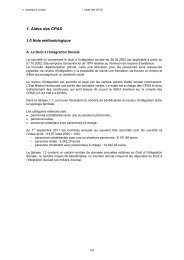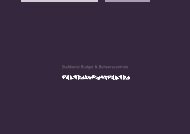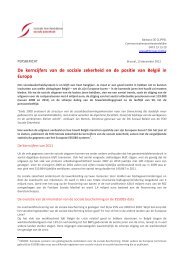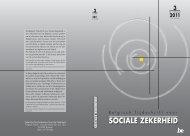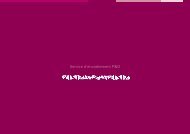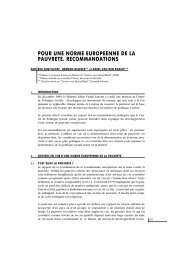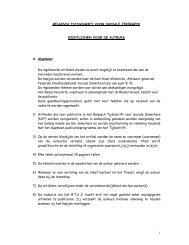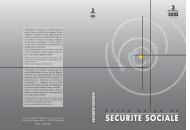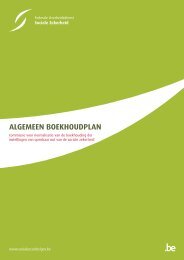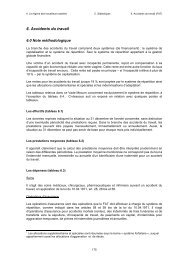social security - FOD Sociale Zekerheid
social security - FOD Sociale Zekerheid
social security - FOD Sociale Zekerheid
- No tags were found...
You also want an ePaper? Increase the reach of your titles
YUMPU automatically turns print PDFs into web optimized ePapers that Google loves.
Sickness benefitsWhen ill, you will not only obtain reimbursement of your sickness costs, but you shall also beentitled to benefits covering your income losses. Such regulations only apply for diseases andaccidents in the private sphere. Diseases and accidents that may be considered occupationaldiseases or accidents at work will be discussed later.As to sickness benefits, a distinction should be made between salaried persons, civil servants andself-employed persons. Our starting point is the salaried persons' scheme. Then, we will indicatethe major differences with the other two systems.A. Salaried personsGenerally, we could say that an employee who opens the right to reimbursement of medical costsis also entitled to benefits in case of disease. Still, a beneficiary has to satisfy some conditions touse his entitlement to sickness benefits.a) Entitled salaried persons must have worked 120 days or assimilated days (paid vacationdays and sickness leave days) during a period of 6 months prior to obtaining the benefits.b) Entitled salaried persons have to prove that they have paid sufficient <strong>social</strong> contributionsfor the sickness benefits sector. The contributions must reach a particular minimumamount or be completed with personal contributions.c) The entitled persons satisfying the preceding conditions maintain their entitlement tobenefits until the end of the quarter following the quarter in which they finished theirwaiting period.Incapacity for work consists of two periods: the primary incapacity for work and the periodof invalidity.If there is no presumption of incapacity for work (e.g. in case of a hospital stay), the incapacityfor work should be declared to the insurance institution by means of a medical statement,which is filled out, dated, undersigned and mentions the reason for the incapacity. Then, theadvising practitioner of the insurance institution shall establish the degree of incapacity. He canalso request the person concerned present himself for a medical examination to establish theincapacity for work and the duration (beginning and end).A.1. Primary incapacity for workThe compensation paid by the insurance starts after the possible granting of the guaranteedsalary by the employer (which is generally to be paid during a month for the employees andduring two weeks for the workers). Primary incapacity for work lasts maximum one year andstarts at the beginning of the incapacity for work. During this period, you will receive 60% of yoursalary from the insurance institution (limited to 118.5852 EUR for incapacities prior to 1 January2005, 120.9569 EUR for incapacities that occurred between 1 January 2005 and 31 December2006, 122.1665 EUR for incapacities that occurred between 1 January 2007 and 31 December2008, 123.1437 EUR for incapacities that occurred between 1 January 2009 and 31 December2010 and 124.0057 for incapacities that occurred since 1 January 2011). In principle, no benefitsare awarded for the periods covered by the guaranteed salary at the employer's expense.48



